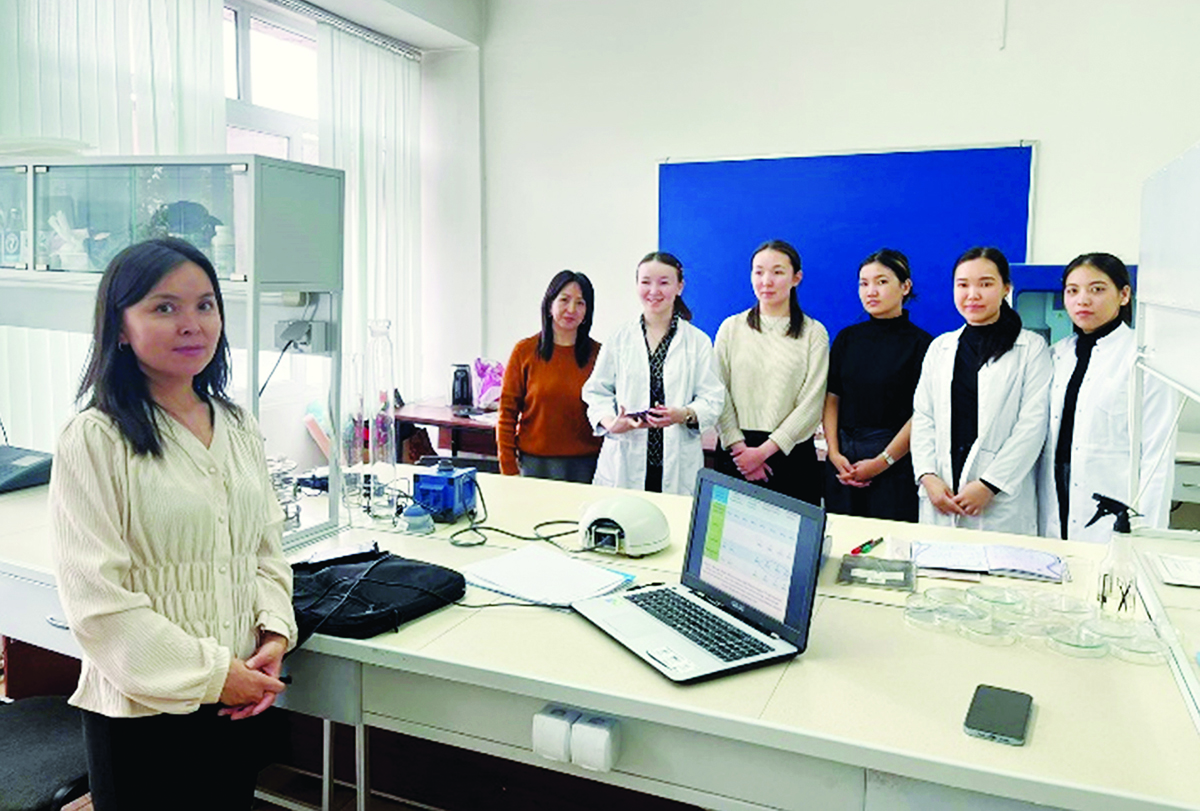Familiarized with the work of the scientific laboratory

For the 3rd year students studying on educational programs "Biotechnology" and "Biological Engineering", the event "Open Day of the Department of Biotechnology" was held. The aim of the event was to provide students with motivation and values for their future profession.
During the Open Day students were given a great opportunity to familiarize themselves with fundamental and applied research works carried out by the scientific laboratories of the department and the teaching staff. The students were shown the results obtained in the framework of scientific projects in various directions and the prospects of their application in practice and implementation in production in the country.
A. Madautova, a master student of the 1st year of biotechnology, familiarized the students with the results of scientific-research work carried out in the laboratory of plant biotechnology within the framework of the theme of improving the methods of biotechnological reproduction for the introduction of a natural source of sugar substitute stevia plant in the production industry of the Republic of Kazakhstan. Obtaining on the basis of biotechnological methods of new selective lines adapted to climatic conditions of the Southern region of Kazakhstan, high-yielding, resistant to pests and diseases. She made a report defining the ways of their introduction into crop production, creation and expansion of the range of "new generation food products" of functional purpose from stevia raw materials, on the basis of which the possibility of production and commercialization of domestic goods demanded in the future by the main consumers. At the same time, with the participation of a number of undergraduate and graduate students in South Kazakhstan continues research work on obtaining productive breeding lines of stevia, suitable for zoning, as well as on the preparation of beverages of functional purpose from stevia raw materials, which, in turn, will allow to expand stevia plantations and provide a source of raw materials for domestic stevia, necessary for the transformation of the range of products of new generation of functional purpose.
Д. B.Sc., Professor S. Atabaeva familiarized the students with the directions of research work carried out under her leadership in the laboratory "molecular ecophysiology". They reported the results of research work on studying the influence of heavy metals and salts on physiological and biochemical processes of agricultural plants (wheat, rice, Chinese peas, barley) and the development of phytoremediation technologies. In addition, the teacher of Dokbai presented to students a presentation report defining the relevance and practical significance of the scientific project conducted in this laboratory under the guidance of Dr. B.Sc., Professor S. Kenzhebaeva on the topic: "molecular and biochemical characterization of resistance of mutant spring wheat germoplasm to yellow and leaf rust diseases, morphometry and grain quality". During familiarization with the laboratories students were given molecular and biochemical research work performed to determine the productivity of the obtained new mutant lines, their resistance to various rust diseases and morphometric indices, grain quality, nutritional value, i.e. protein content in grains and bioavailability of important micronutrients (Fe, Zn,) with a description of modern methods used in obtaining mutant germoplasm of mutant spring soft wheat generalized review of innovative technologies. Familiarized with the main scientific achievements obtained as a result of the search work and the possibilities of their application in practice.
Senior lecturer A. Talipova acquainted students with the directions of scientific research carried out in the laboratory "biomaterials", i.e. technologies of purification of keratin wastes of poultry production using a consortium of active heat-loving bacteria with keratin-destroying properties, as well as obtaining products rich in probiotics immobilized on polysaccharide symbiotic matrix based on a combination of mare and goat milk. Dr. Ernazarova reported on the possibilities of growing microalgae and aquatic plants in vitro in the laboratory "cell biotechnology" and obtaining high-value products in medicine, pharmacology and food production using them as natural sources of biologically active substances.
Saltanat Asrandina,
Candidate of Biological Sciences, Associate Professor